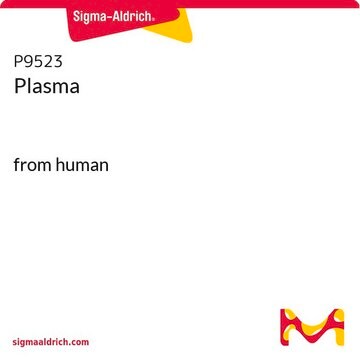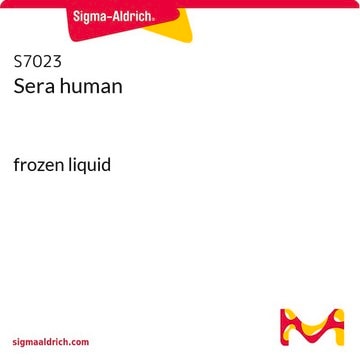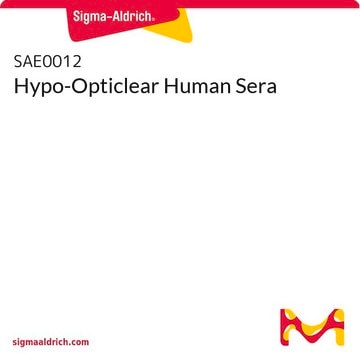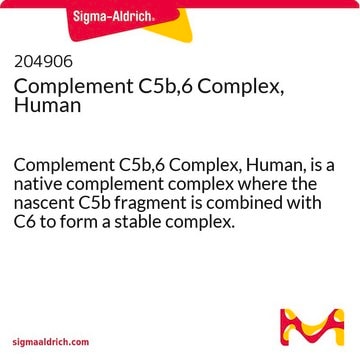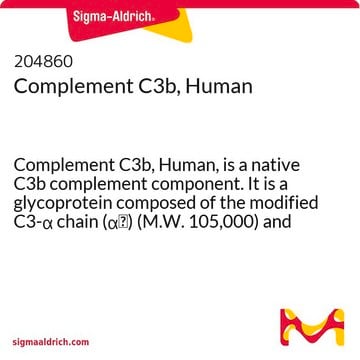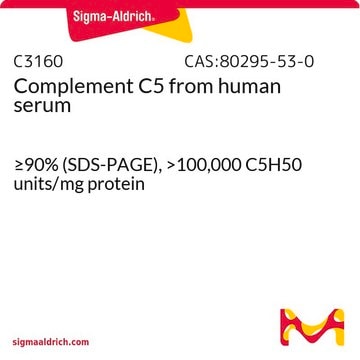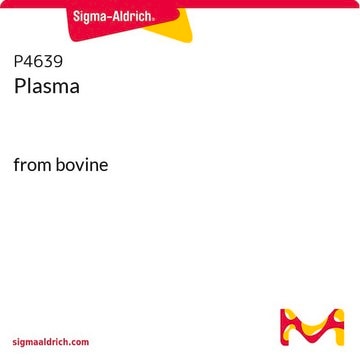P2918
Human Serum
from platelet poor human plasma, sterile-filtered, (mycoplasma tested, virus tested)
Synonym(s):
human plasma, human sera, human serum
Sign Into View Organizational & Contract Pricing
All Photos(1)
About This Item
Recommended Products
biological source
human
sterility
sterile-filtered
origin
USA origin
technique(s)
cell culture | mammalian: suitable
impurities
(mycoplasma tested, virus tested)
≤10 EU/mL endotoxin
shipped in
dry ice
storage temp.
−20°C
Looking for similar products? Visit Product Comparison Guide
General description
The serum is the fluid part of the blood containing plasma without fibrinogen.
Application
Human Serum has been used:
- in the preparation of human serum samples that mimic the COVID-19 patient samples for serological antibody testing
- as a media supplement to differentiate human induced pluripotent stem cells (hiPS) to hiPS- brain microvascular endothelial cells (BMEC)
- for culturing transgenic Plasmodium falciparum clone
- for assessing the electrochemical response of recombinant P. falciparum parasite L-lactate dehydrogenase (LDH) in serum samples
- in platelet-derived growth factor (PDGF) purification assays
Human serum from platelet poor plasma (PPP) is useful for studies of the effects of platelet lysates on the growth of cells such as articular chondrocytes and human skin fibroblasts. It has also been used in platelet derived growth factor (PDGF) purification assays.
Biochem/physiol Actions
Serum serves as a supplement to basal media formulations and conventional biomedical cell culture media. It acts as a source of trace nutrients, signaling molecules, growth factors, and hormones that induce proper cell growth in vitro. Human serum from platelet-poor plasma (PPP) is useful in the studies of the effects of platelet lysates on the growth of cells such as articular chondrocytes and human skin fibroblasts.
Analysis Note
Endotoxin tested
Other Notes
It is not unusual for a white precipitate to form following a freeze-thaw cycle for this human serum product.
Disclaimer
RESEARCH USE ONLY. This product is regulated in France when intended to be used for scientific purposes, including for import and export activities (Article L 1211-1 paragraph 2 of the Public Health Code). The purchaser (i.e. enduser) is required to obtain an import authorization from the France Ministry of Research referred in the Article L1245-5-1 II. of Public Health Code. By ordering this product, you are confirming that you have obtained the proper import authorization.
Storage Class Code
10 - Combustible liquids
WGK
WGK 3
Flash Point(F)
Not applicable
Flash Point(C)
Not applicable
Certificates of Analysis (COA)
Search for Certificates of Analysis (COA) by entering the products Lot/Batch Number. Lot and Batch Numbers can be found on a product’s label following the words ‘Lot’ or ‘Batch’.
Already Own This Product?
Find documentation for the products that you have recently purchased in the Document Library.
Customers Also Viewed
Physiology, Blood Plasma null
Edward N O'Neill et al.
Comprehensive reviews in food science and food safety, 20(1), 686-709 (2020-12-17)
Innovation in cultivated meat development has been rapidly accelerating in recent years because it holds the potential to help attenuate issues facing production of dietary protein for a growing world population. There are technical obstacles still hindering large-scale commercialization of
Aver Hemben et al.
Talanta, 187, 321-329 (2018-06-02)
This paper describes the development of an affinity sensor for the detection of Plasmodium falciparum parasite lactate dehydrogenase (pLDH) as one of the biomarkers used for malaria detection. The gold sensor was functionalised with anti-pLDH after cleaning the electrode surface
Marie Piantino et al.
Materials today. Bio, 14, 100232-100232 (2022-03-22)
The blood-brain barrier (BBB), a selective barrier formed by brain microvascular endothelial cells (BMEC), represents a major challenge for the efficient accumulation of pharmaceutical drugs into the brain. The receptor-mediated transcytosis (RMT) has recently gained increasing interest for pharmaceutical industry
Y Umeno et al.
Journal of cell science, 94 ( Pt 3), 567-575 (1989-11-01)
We examined the proliferative behaviour in tertiary culture cells of human skin fibroblasts (HSF) as well as cells of the rat 3Y1 diploid fibroblast line placed on a plastic substratum in a nutrient-rich medium containing high concentrations of platelet-poor plasma
Our team of scientists has experience in all areas of research including Life Science, Material Science, Chemical Synthesis, Chromatography, Analytical and many others.
Contact Technical Service


